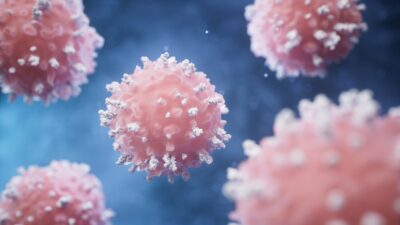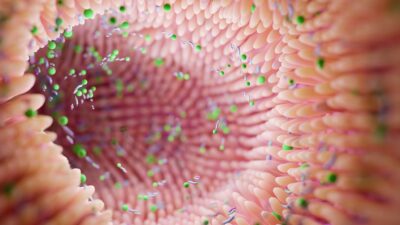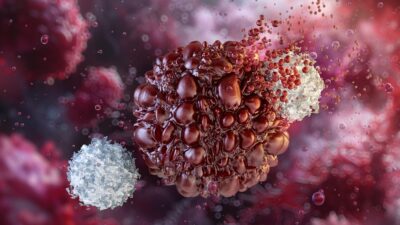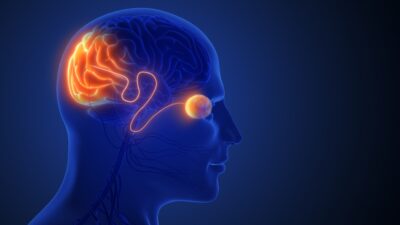Fundamental Metabolic Changes Accompany Alzheimer’s Disease
- One key gene has been singled out as a target.

A paper published in Cell Metabolism has reported on a metabolic shift in neurons derived from patients with Alzheimer’s disease, showing that they express a cancer-like phenotype [1].
Induced neurons
Rather than attempting to harvest live neurons from Alzheimer’s patients, the researchers chose to create induced neurons (iNs) from the fibroblasts of these patients, comparing them to cells from a control group matched for sex, age, and ApoE allele, which is a significant factor in Alzheimer’s. This lab had previously shown that these cells retain the aging signatures of their donors; this conversion of cell type does not result in an epigenetic reset [2]. However, despite this, the iNs of Alzheimer’s patients quickly lose their markers of neuronal maturity, regressing to a hypo-mature state that is reminiscent of cancer [3].
The researchers examined metabolism and gene expression to determine precisely why this is the case.
Aberrant metabolism
Interestingly, Alzheimer’s disease did not restrict neurons from being converted from fibroblasts; there was no significant difference between the control and Alzheimer’s groups in this respect.
However, there were significant differences in gene expression. Narrowing down their targets to genes that were correlated both with the presence of Alzheimer’s disease and active cognitive decline, the researchers found six gene modules that were correlated, positively or negatively. Many of these genes had to do with development, cancer, the cellular cycle, alternative RNA splicing, synapses, and metabolism in ways that affirm the previous work relating to hypo-maturity. Critically, these results were found to be strongly correlated with the results of reference material derived from post-mortem Alzheimer’s and control brain tissue.
One of the most important genes was found to be PKM. The total amount of PKM between iNs derived from the control group and from Alzheimer’s patients did not differ. This is where the alternative splicing becomes important: in the control group, the balance was tilted in favor of PKM1, which is metabolically active and supports mitochondrial oxidation. However, the Alzheimer’s group produced significantly more PKM2, which is less metabolically active and results in an increased production of lactate and the accumulation of glycolytic metabolites. This shift, known as the Warburg effect, is associated with cancer [4].
These gene expression differences were confirmed with functional biomarkers. While there were no significant differences in mitochondrial respiration found between the iNs, the increased production of lactate and glycolysis were found to occur, along with an expected increased uptake of glucose and an increased demand for NAD+.
Finally, and possibly most importantly, the researchers found that this imbalance towards PKM2 renders the neurons more vulnerable to death by apoptosis, which is normally heavily repressed in mature neurons.
A possible treatment
Treating the iNs with a PKM2 inhibitor, shikonin, significantly decreased the amount of PKM2 without any clear side effects in morphology or function. It also appeared to reverse their Warburg-like phenotypes, reducing glycolytic metabolites and lactate back to that of the control group. It did not harm mitochondrial function, restored NAD+ levels, and protected against apoptosis.
While it is not clear if any form of shikonin will ever be administered as a treatment, these results clearly show that PKM2 might be a valuable target in the treatment of Alzheimer’s disease.
Conclusion
The upstream and downstream causes and effects of Alzheimer’s clearly go beyond the accumulation of beta amyloid. These researchers hold that this metabolic shift is central to the fundamental dysfunctions of Alzheimer’s disease, referring to it as a “pathogenic program”. However, as the researchers note, this study does not fully show the entire environment of Alzheimer’s disease; the neurons are not exposed to the toxic amyloid proteins nor are they in the presence of glial cells. Further, more in-depth research and animal studies will be required to determine if PKM2 is a druggable target.
Literature
[1] Traxler, L., Herdy, J. R., Stefanoni, D., Eichhorner, S., Pelucchi, S., Szücs, A., … & Mertens, J. (2022). Warburg-like metabolic transformation underlies neuronal degeneration in sporadic Alzheimer’s disease. Cell metabolism.
[2] Mertens, J., Paquola, A. C., Ku, M., Hatch, E., Böhnke, L., Ladjevardi, S., … & Gage, F. H. (2015). Directly reprogrammed human neurons retain aging-associated transcriptomic signatures and reveal age-related nucleocytoplasmic defects. Cell stem cell, 17(6), 705-718.
[3] Mertens, J., Herdy, J. R., Traxler, L., Schafer, S. T., Schlachetzki, J. C., Böhnke, L., … & Gage, F. H. (2021). Age-dependent instability of mature neuronal fate in induced neurons from Alzheimer’s patients. Cell Stem Cell, 28(9), 1533-1548.
[4] Puckett, D. L., Alquraishi, M., Chowanadisai, W., & Bettaieb, A. (2021). The role of PKM2 in metabolic reprogramming: insights into the regulatory roles of non-coding RNAs. International Journal of Molecular Sciences, 22(3), 1171.








